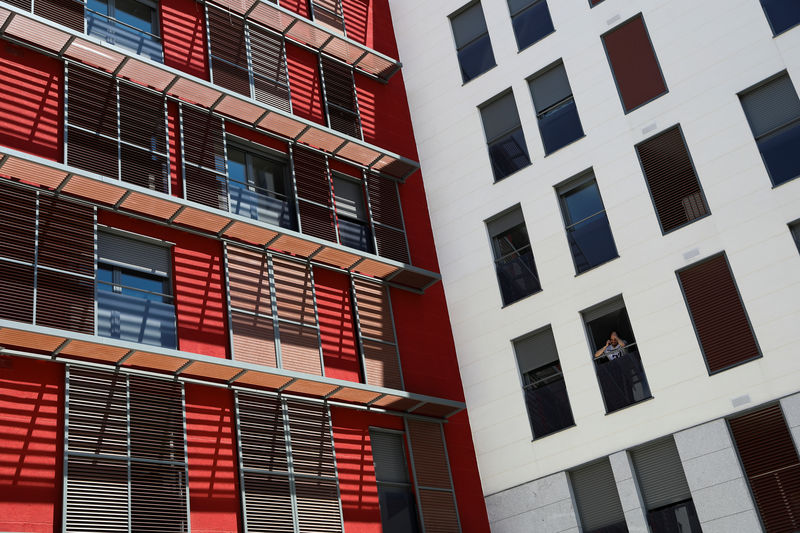By Jesús Aguado and Ingrid Melander
MADRID (Reuters) - Spain's 'bad bank' is joining the ranks of the world's biggest real estate funds as it swaps loans for property in an attempt to limit losses on toxic assets it took on during the financial crisis.
Sareb took over more than 50 billion euros ($57 billion) in real estate and other toxic assets from nine Spanish savings banks in 2012, part of a rescue deal as the government sought to try and draw a line under the country's banking crisis.
Since the outbreak of the financial crisis in 2008, the number of Spanish lenders has shrunk to 12 from more than 55 and survivors have drastically streamlined operations and reduced their non-performing assets by 60% from a peak in 2013.
But Sareb is struggling, as a slump in Spanish real estate prices has depressed the value of loans and foreclosed assets it took on, despite Sareb buying them at the time at an average discount of 46% and 63% respectively.
Its difficulties contrast with the success of some other 'bad banks' set up in Europe after the financial crisis, such as in Britain and Ireland where property markets have rebounded.
Sareb, owned by Spain's banks and the state bailout fund FROB, has only managed to sell a third of its real estate and financial assets since it was established and has repaid less than a third of its senior debt.
The bad bank says its best hope is to claw back money by foreclosing on real estate loans and sell the properties itself.
"Transforming loans gives us more liquidity on those assets. It is easier for us to sell the real estate development, than to directly sell the loan," Iker Beraza Perez, deputy general director for strategy and pricing at Sareb, told Reuters.
When the bad bank originally took on 200,000 assets for more than 50 billion euros, 80% were loans.
Under its new plan, Sareb is focused on transforming up to 18 billion euros from a total of 22 billion euros in outstanding loans to real estate developers into assets in order to gain access to the collateral and be able to sell it afterwards.
That is on top of 12.4 billion euros in real estate assets it held as of the end of 2018, and ranges from unfinished apartment blocks in Benidorm and villas on the Costa del Sol, to parking lots and offices in cities across Spain and undeveloped land in rural areas.
"Sareb was always going to end up being a real estate agency, sooner or later," a source at a Spanish real estate company, involved in transactions with the bad bank, said.
Some of this transformation was already under way via negotiations with developers but Sareb is now planning to speed up filing lawsuits against those who don't fulfill their payments, targeting a total of around 8 billion euros in loans.
In 2017, it started these proceedings on loans worth 1 around billion euros but legal proceedings take time and can delay the moment they get access to the assets by up to four years. So far, Sareb says it has transformed 5.8 billion euros into assets.
When Sareb was set up, it targeted a return on equity of around 14%-15% but Beraza said market conditions meant the lender would not be able to deliver a positive return.
Ireland's National Asset Management Agency (NAMA) was also initially seen as a liability when it was created in 2009.
But thanks to a recovery in the economy and property prices in Ireland, NAMA's 32 billion euro deleveraging program was 94% complete at the end of 2018.
Britain's 'bad bank' set up to manage more than 100 billion pounds ($127 billion) of assets repaid the last of its government loans this month.
CHANGE OF TACK
Sareb has been forced to change tack as rising competition from banks in shedding assets since 2017, with discounts ranging from 50% on foreclosed assets to over 70% on some fire block sales of non-performing assets, eroded its business plan.
"We can't sell at the same discounts as those applied by the banks, and it looks like they're still going to hold that kind of discount for a while," Beraza said.
In 2018, Sareb reported a loss of 878 million euros, while revenues fell by 5%.
By the end of 2018, Sareb's assets were worth 34 billion euros. In 2014, Sareb brought in four external managers to manage its assets but among its new plans Sareb now wants to renegotiate the terms of its contracts with those managers.
The four managers are Haya Real Estate, which is owned by private equity fund Cerberus, and real estate services companies Altamira, Solvia and Servihabitat. The contracts with Altamira, Solvia and Servihabitat expire in 2021.
Haya was assigned a portfolio of 18 billion euros but its contract with Sareb expires in December and won't be renewed, Beraza told Reuters, adding that a new competitive process would kick off with non-binding offers expected by July.
Sareb, which wants to reduce fixed management fees and establish a performance fee dependent on property sales, has already sent a letter to Haya and the other three managers to invite them to participate under new conditions, Beraza said.
With this initiative Sareb aims to achieve around 300 million euros in cost savings by 2027, when Sareb is supposed to be wound down. The external managers declined to comment.
But achieving that could still be tough. Ratings agency S&P anticipates a slowdown in the Spanish real estate market, from an estimated 4.5% rise in house prices in 2019 to 3.4% in 2020.
That has led some real estate experts to express doubts that Sareb could offload its assets by the end of 2027.
